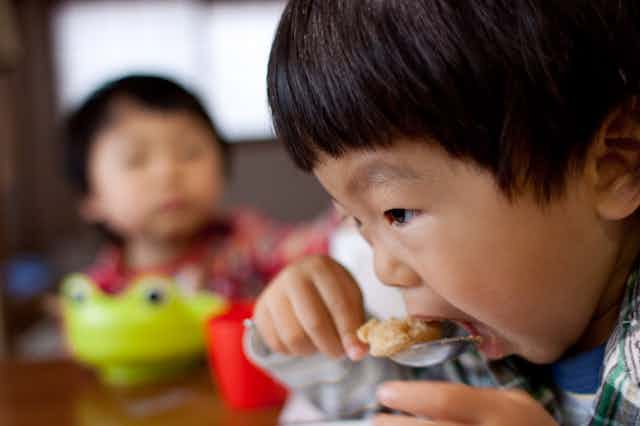Parents winning childhood war on obesity, Australian Bureau of Statistics data reveals, screamed the headline. Sounds like a good news story to make every parent breathe a sigh of relief, but is it really true?
The article in question quoted obesity expert and University of South Australia Professor Tim Olds, who argued that “the media and public health authorities are getting carried away” about childhood obesity.
He pointed to the fact that recent ABS data showed rates of overweight and obesity in children plateaued between 2007/08 and between 2011/12.
But that still means one in four Australian children is overweight or obese; it’s clear we still have a lot of work to do.
As a nutritionist working with parents every day (both in practical obesity programs and in research into reducing this considerable health risk), I was concerned that the article could be taken at face value. Because there’s more, much more, to this story.
Where the data comes from
The article was published in response to a recent data release from the Australian Health Survey conducted in 2011/12. The survey is a blue-ribbon one: 13,000 adults and children were sampled in patterns that match Australia’s population.
Researchers went into family homes to weigh and measure children. They asked them to keep a food diary, then fill out a food frequency survey to cross check how typical this is of the foods they eat throughout the year.
They kept a physical activity diary and used a pedometer; some of the adults surveyed even had blood tests.
In terms of nutrition and physical activity data, this is as good as it gets.
And in fact, nutrition academics and health policymakers have been eagerly anticipating these results for some time. The last nationally representative nutrition and physical activity survey was in 1995 and, before that, in 1985. (There was a children’s only survey in 2007.)
To date, only basic data has been released, with more to come next year.
And this is the misleading part in terms of the message media reports like the article quoted are delivering. It’s too early to make definitive statements about winning the war on obesity. There’s so much more data to be crunched, so much more depth of understanding to come.
We don’t yet know if the prevalence of childhood obesity is different depending upon where people live, for instance, or their socioeconomic status, age or gender. But, going on what previous surveys have shown, it’s quite likely these variations exist.
The crucial data crunching is yet to be done – working out what food is being eaten in what quantities, and how much physical activity is actually occurring and then linking this with body weight.
A long way to go
It’s only when we’ve done all this that we will be able to tell if Australians are moving more and eating healthier. And only then will we see whether what the article says rings true – that parents are heeding health warnings and changing the way their children eat and move.
But let’s not imagine that this is an easy thing for anyone to do. Indeed, if you ask a parent raising kids, many don’t feel like they’re winning the war on obesity.
Take Linda (not her real name), for example. She feels overwhelmed by a society that simply doesn’t encourage a healthy lifestyle.
Overweight herself, she’s a single mum of two primary school-aged children and works full time in a busy job with inflexible hours. Her eldest child Kylie loves sport, is lean and confident, but her other child Jack is obese, loves gaming and is introverted.
One night recently, she arrived home unexpectedly late after driving her children from one end of the city she lives in to the other, because of sporting commitments.
Jack was really excited about sports for the first time in a long time so she wanted to support that. She had no time to prepare dinner, and the only places open were fast food drive-throughs. Her thoughts of going for an evening walk were thwarted.
Linda is certainly trying to battle obesity but she wouldn’t say she’s winning the war. We can all think of what she should have or could have done but in truth what she struggles with is pretty common.
It’s great that the proportion of Australian children above a healthy weight has not increased since 2007 but the fact remains that one in four Australian children is overweight or obese.
This means in four children in Australia has compromised health now and is going to have more trouble maintaining a healthy weight when they are older, when their risk of chronic disease will increase.
One in four children probably has parents who are worried about them and want to do something about it. For these parents, the war on obesity is far from won; they are still fighting.

